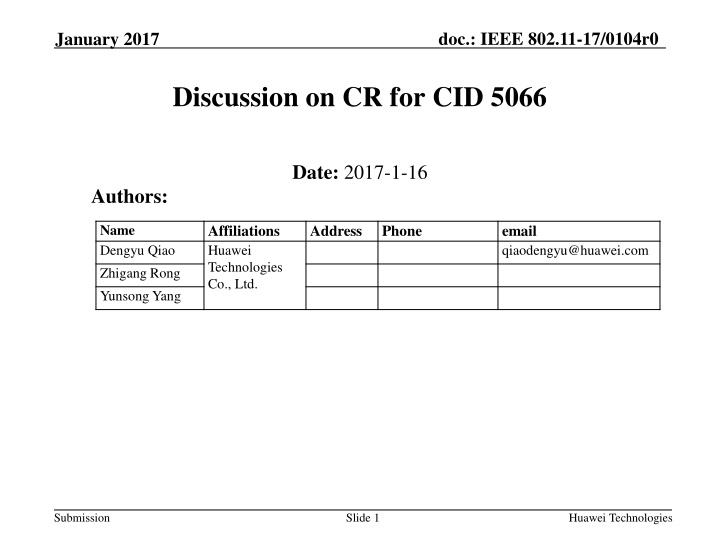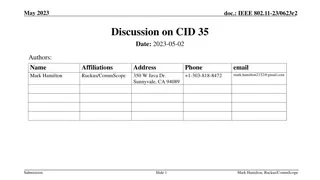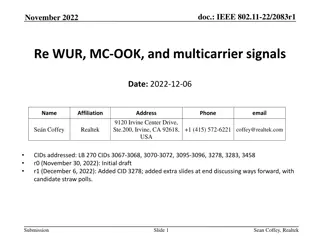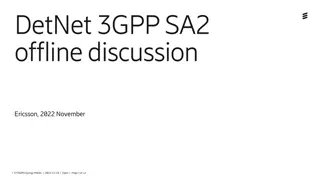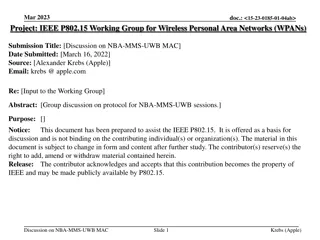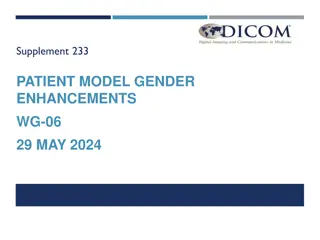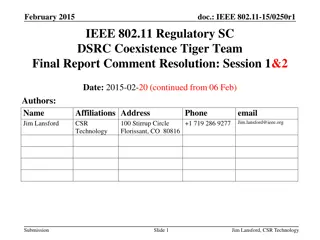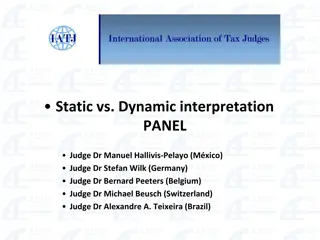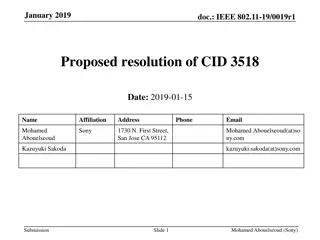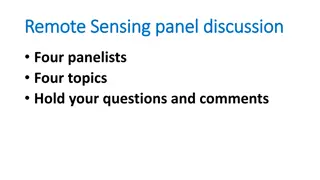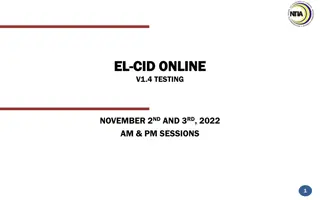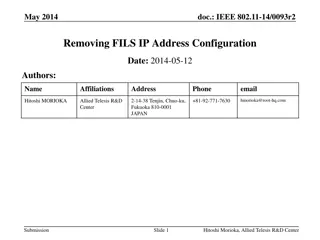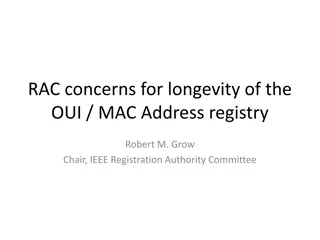Discussion on Improving Transmission Efficiency in IEEE 802.11 TWT Mechanism
This document proposes enhancements to the IEEE 802.11 TWT mechanism to address issues related to random access Resource Units (RU) utilization. By defining a mechanism to optimize RU allocation for TWT scheduled STAs, the proposal aims to improve transmission efficiency and power saving, particularly in scenarios of network congestion. The discussion emphasizes the need for a more effective approach to contend with unscheduled STAs accessing RUs during TWT service periods.
Download Presentation

Please find below an Image/Link to download the presentation.
The content on the website is provided AS IS for your information and personal use only. It may not be sold, licensed, or shared on other websites without obtaining consent from the author.If you encounter any issues during the download, it is possible that the publisher has removed the file from their server.
You are allowed to download the files provided on this website for personal or commercial use, subject to the condition that they are used lawfully. All files are the property of their respective owners.
The content on the website is provided AS IS for your information and personal use only. It may not be sold, licensed, or shared on other websites without obtaining consent from the author.
E N D
Presentation Transcript
doc.: IEEE 802.11-17/0104r0 January 2017 Discussion on CR for CID 5066 Date: 2017-1-16 Authors: Name Dengyu Qiao Zhigang Rong Yunsong Yang Affiliations Huawei Technologies Co., Ltd. Address Phone email qiaodengyu@huawei.com Submission Slide 1 Huawei Technologies
doc.: IEEE 802.11-17/0104r0 January 2017 CID 5066 CID Clause Page Line Comment Proposed Change 5066 9.3.1.23 45 36 In TWT SP, if AP want to use random access RU to collect buffer status information from TWT scheduled STAs, AP can send a Trigger frame to indicate an RU with AID12=0. But a STA that has no TWT capability also can use the RU to do OFDMA random access. This is inefficient way. Define a mechanism to solve this issue. Submission Slide 2 Huawei Technologies
doc.: IEEE 802.11-17/0104r0 January 2017 Abstract This proposal can improve transmission efficiency and power saving of TWT mechanism, especially when network congestion increases For random access RU that is allocated during TWT service period, TWT scheduled STA needs to contend with other STAs that support random access When many STAs unscheduled by TWT contend for random access RU, TWT scheduled STA will frequently fail to send UL frame by random access RU. One AID value is assigned to indicate random access RU dedicated to TWT STA Submission Slide 3 Huawei Technologies
doc.: IEEE 802.11-17/0104r0 January 2017 Background: TWT Procedure As TWT negotiation is optional for broadcast TWT, TWT scheduled STA may not wake up for every TWT SP. AP needs to know which TWT scheduled STA has waked up. As not every TWT scheduled STA has UL data to transmit, TWT scheduling STA needs to collect buffer report from TWT scheduled STA Submission Slide 4 Huawei Technologies
doc.: IEEE 802.11-17/0104r0 January 2017 Background: Random Access in TWT Service Period OFDMA random access is an efficient way to collect buffer report or PS-Poll from TWT STA. AID=0 in trigger frame identifies an RU for random access. Any STA can send frame in the RU after OFDMA backoff procedure AID12=0 indicates RU for random access Submission Slide 5 Huawei Technologies
doc.: IEEE 802.11-17/0104r0 January 2017 Motivation (1/2) Any STA can perform OFDMA random access as long as it receives a Trigger frame containing a RU with AID = 0, even during TWT service period. TWT STA may collide with non-TWT STA at random access RU. Submission Slide 6 Huawei Technologies
doc.: IEEE 802.11-17/0104r0 January 2017 Motivation (2/2) When network congest increases, TWT scheduled STA will hard to send UL frame by random access RU during TWT SP, and may be also hard to send outside TWT SP, especially for those STAs that have no negotiation with TWT scheduling. Even though severe collision is detected by AP, AP can do nothing for helping TWT STA to contend for random access RU, during TWT service period. Submission Slide 7 Huawei Technologies
doc.: IEEE 802.11-17/0104r0 January 2017 Proposed scheme An AID value indicates a random access RU dedicated to TWT scheduled STAs TWT scheduling STA can choose one available AID value and indicate it in TWT IE Different AID values are allocated for Broadcast TWT IDs A bit in Control field to indicate AID for Random Access field is present or not Element ID Length Control Request Type Target Wake Time TWT Group Assignmen t Nominal Minimum TWT Wake Duration TWT Wake Interval Mantiss a Broad cast TWT ID TWT Channel NDP Paging AID for Random Access B1 B2 B3 B4 B5 B8 NDP Paging Indicator Responder PM Mode Broadcast Indicator for AID for Random Access Reserved Submission
doc.: IEEE 802.11-17/0104r0 January 2017 Proposed Procedure When AP detects collision, AP may send Trigger frame to indicate an Random Access RU dedicated to TWT Scheduled STA Submission Slide 9 Huawei Technologies
doc.: IEEE 802.11-17/0104r0 January 2017 Benefit TWT mechanism can be more efficient Power consumption of TWT scheduled STA can be reduced. Submission Slide 10 Huawei Technologies
doc.: IEEE 802.11-17/0104r0 January 2017 Straw Poll 1 Do you support that an AID value is allocated to identify an random access RU dedicated to TWT scheduled STA? Y/N/A Submission Slide 11 Huawei Technologies
